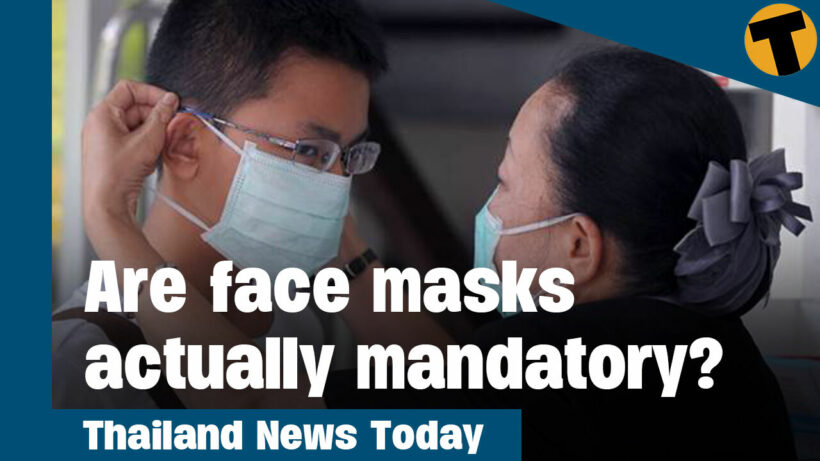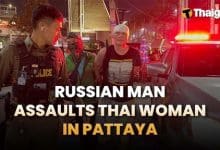Thailand News Today | Is wearing face masks in Thailand mandatory?

Legally, we can’t force you to do it, but just do it, okay?
That seems to be the message from Thailand’s Public Health Minister in relation to the wearing of face masks.
According to a report from the National News Bureau of Thailand, Anutin Charnvirakul has confirmed there’s no legal mandate for the wearing of face masks…. at least that’s what he says. However, he says people should continue to wear them to prevent the spread of Covid-19.
Anutin was responding to warnings from the CCSA that those who refuse to wear a mask could be fined. According to an order published in the Royal Gazette back in June 2021, face masks are required to be worn in public places. First-time violators face a fine of up to 1,000 baht and the fines can go up to 20,000 baht for repeat offenses. The CCSA recently made a post on Facebook, reminding the public of the penalties, but has since removed the post.
In a meeting with Thai media yesterday, a reporter mentioned the CCSA’s Facebook post on the mask mandate and asked if foreigners will face these penalties for not wearing masks in public? Anutin responded by saying he didn’t know about the mask mandate and the CCSA never shared the information with him.
Anutin was quoted saying “I still did not know much about the details. There is still no report to the Ministry of Public Health right now. It has to be considered again. In my opinion, people should wear masks at all times. However, some foreigners don’t want to. So, the topic has to be discussed during the CCSA meeting.”
The health minister says he plans to discuss this issue with the CCSA, adding that while the wearing of face masks may not be required in their home countries, visitors to Thailand should follow public health regulations while in the kingdom.
Anutin hit the headlines both here and internationally in the early days of the pandemic when he berated foreigners (aka, “dirty farangs”) for not wearing face masks. His comments were seemingly fuelled by a loss of face as bemused foreigners refused the free masks he was handing out as part of a PR stunt at a Bangkok station.
He then went as far as to suggest that foreigners should be kicked out of the country. His tirade went viral and many blame his comments for a disturbing wave of xenophobia that emerged shortly after.
When asked if Thailand would introduce stricter measures if daily case numbers reach 10,000 again, Anutin says that situation is one of a number of scenarios envisaged by the Department of Disease Control. If the number of hospitalized or severely ill patients does not increase, and people continue to get vaccinated, he can’t see any stricter measures being introduced at this time. However, he is urging everyone to remain on their guard and for the country to pull together.
—
Officials on the island province of Phuket have expressed alarm at the number of foreign tourists testing positive on arrival and are pointing the finger at allegedly fake results from pre-departure PCR tests.
Deputy governor Pichet raised the issue during a call with the CCSA, in which he urged the government’s Covid task force to improve screening measures for overseas arrivals.
He was quoted saying that “False PCR test results are assumed to have something to do with the sharp rise in the number of post-arrival positive tests among tourists. These problems are something beyond Phuket’s authority to deal with and help is needed from the CCSA’s operations center.”
According to a report, some travelers are also arriving armed only with antigen test results, despite pre-departure PCR testing being a condition of entry. Phuket now wants the Civil Aviation Authority of Thailand to issue a warning to airlines who allow passengers to travel without the necessary documentation.
Pichet has expressed concern that the number of infected arrivals is only going to go up as more people register through the re-launched Test & Go entry scheme. If this happens, it will place an increased burden on the island’s hospitals and hospital isolation facilities.
Meanwhile, the director of Vachira Phuket Hospital says an infection rate of 3% is being reported from day 1 tests on arriving passengers. He adds that the situation is still under control but if the rate surpasses 5%, hospital and hotel isolation rooms risk being overwhelmed.
The CCSA has reported that up to 40% of over 20,000 applicants who registered for Test & Go on day 1 of its re-opening are traveling to Phuket. On Monday and Tuesday of this week, Thailand welcomed 7,742 overseas arrivals, 344 of whom tested positive on arrival.
—-
In the aftermath of a fatal accident where a motorbike hit and killed a pedestrian, Bangkok officials plan to install traffic lights and surveillance cameras at 100 zebra crossings.
The lights will be installed in two weeks, and the cameras in a month. Out of the city’s 3,280 zebra crossings, only 1,277 have flashing lights warning drivers to slow down before they reach the crossing. 226 have push-to-walk buttons, and only 430 are painted red.
Bangkok’s deputy governor said workers are improving crosswalks by making more space for people to cross and painting them so that people will see them more clearly. The Deputy Commissioner of the Metropolitan Police Bureau said the fine for traffic violators will soon go up from a maximum of 1,000 baht to one of 4,000 baht. He urged people to photograph drivers who don’t stop at zebra crossings and send the photos to the police. This way, people can get rewarded from the violators’ fines.
In 2017, Thailand had the highest rate of deaths from road accidents in the world, according to World Atlas. The average road traffic death rate that year was 36.2 per 100,000 population. In a meeting on Tuesday, Deputy PM Prawit vowed to punish traffic violators more harshly, and also start pedestrian safety education in educational institutions for all ages. Teachers will get teaching materials for these programs, he said.
—-
The House committee on corruption and misconduct prevention and suppression plans to probe a Bangkok candidate for governor after an anonymous party sent a complaint to the House committee chairman last month.
The complaint said the candidate’s wealth was unusual, and he had committed wrongdoing. A committee spokesperson said the probe will start soon.
The candidate, Sushatshavi, said he is ready for the probe, and confident he has done nothing wrong. There was also an announcement by the National Anti-Corruption Commission in December about a list of Suchatvee’s assets, and debts he owed.
The spokesperson said the candidate’s wealth rose from 44 million baht in 2016, to 74 million baht in 2020, to 342 million baht last October.
When he declared his assets and debts, he said he had 342.11 million baht in assets, and 35.19 million baht in debts. Some of his assets, he said, are a 35 million baht house, and a Porche worth 2.5 million baht.
Mr Suchatvee is the former president of King Mongkut’s Institute of Technology Ladkrabang and is running for governor with the Democrat Party.
This probe follows another recent political scandal in Thailand where in January, Thailand’s ruling Palang Pracharat Party ousted MP ธรรมนัส พรหมเผ่า after he encouraged voters in Songkhla province to vote for someone from a wealthy family in an election.
—-
A giant rock in Naga Cave, located in the Bueng Kan province of Northeastern Thailand, is drawing in tourism to the province because of its resemblance to a mythical creature.
The rock has bumps that sum say look like the Naga, a mythical serpent that Northeastern Thais believe brings rain to their crops. The rock is now drawing tourism to Bueng Kan, and 20 hotels in the nearby district are 90% occupied on average.
The Naga Cave is inside the ภูลังกา National Park. The president of the Tourism Council of Bueng Kan said a team from the council first discovered the rock in 2020, and it then gained social media attention.
The legend of Naga holds deep meaning in Northeastern Thai legends, and legends from other Southeast and South Asian cultures. These cultures believe Naga is a giant serpent with many heads. It has spiritual meaning in both Buddhism and Hinduism. The Northeastern Thai legend says that the water angel ordered Nagas to play in a lake, so water would spill onto people’s crops as rain.
Every year in the Northeast, people shoot self-made rockets into the sky to wake up the Naga, hoping the Naga will send rain down to their crops.
Latest Thailand News
Follow The Thaiger on Google News:


























